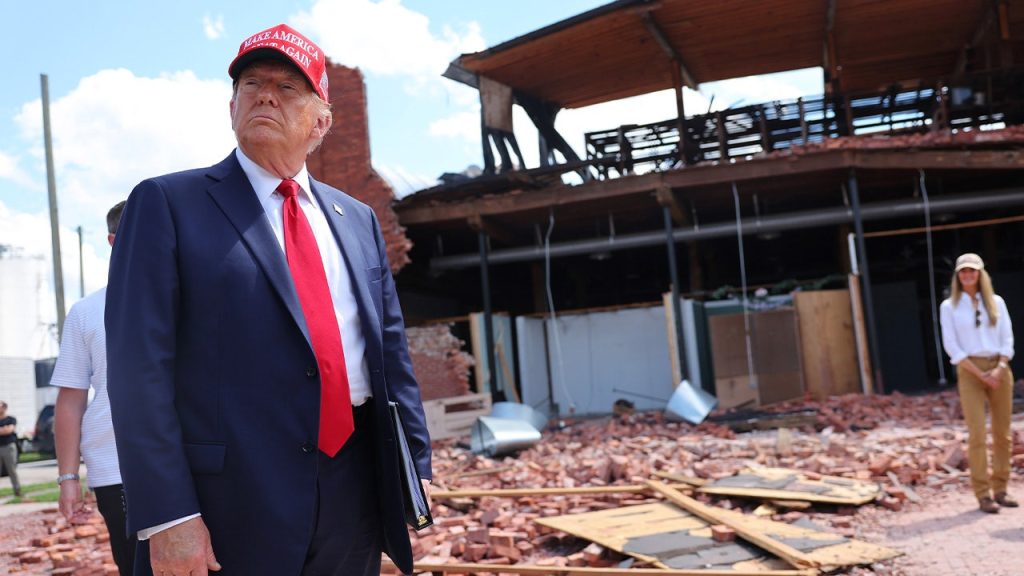Former President Trump announced a campaign rally in Aurora, Colorado, for Oct. 11, with the intention of highlighting the “flood” of migrants in the city. He has criticized the migrant situation in Colorado, claiming that some 43,000 illegal immigrants have entered nearby Denver and Aurora. The campaign also pointed to the Tren De Aragua gang’s takeover of multiple apartment buildings in Aurora, with reports of violence, theft, and drug activity. Trump’s campaign denounced Vice President Kamala Harris’ open-border policies, attributing the chaos in Aurora to these policies and emphasizing the need for strong border security measures.
According to the campaign, Aurora, Colorado, has seen an increase in violent Venezuelan prison gang members from Tren de Aragua, leading to fear and chaos in the community. Local families have been forced to flee their homes as gang members terrorize apartment complexes, committing crimes such as armed robbery, theft, and drug trafficking. The campaign blamed the situation on Harris’ border policies, arguing that they have turned once-safe communities into nightmares for law-abiding citizens. Trump’s campaign proposed electing him as president as a solution to the border crisis, promising to secure the border, deport criminals, and restore safety to America.
Tren de Aragua gang members were arrested in connection to the alleged takeover of an apartment complex in Aurora in 2023. The Whispering Pines Apartments experienced violent assaults, murder threats, extortion, child prostitution, and other criminal activities. A Denver law firm hired to investigate the incident found evidence of trespass violations, assaults, human trafficking, sexual abuse of minors, illegal possession of firearms, extortion, and targeting vulnerable immigrant populations. The property manager of the apartment complex described the takeover as unprecedented in his career. The situation raised concerns about the safety and security of immigrants in the community.
Former U.S. Attorney T. Markus Funk highlighted the criminal activities of the Tren de Aragua gang in Aurora, emphasizing the need for action to address the violence and lawlessness in the community. The gang’s activities included assaults, trafficking, extortion, and other illegal activities targeting vulnerable populations. The investigation into the gang’s presence in Aurora revealed a pattern of violence and exploitation that posed a threat to public safety. The situation highlighted the challenges faced by law enforcement and community members in addressing organized crime and protecting residents from criminal elements.
Trump’s campaign rhetoric on the migrant situation in Aurora reflected broader debates about immigration policy and border security in the United States. By linking the gang violence and criminal activities in Colorado to Harris’ policies, the campaign sought to leverage public concerns about safety and law enforcement to advance its political agenda. The focus on addressing the border crisis through stronger enforcement measures and deportation of criminals resonated with supporters of Trump’s tough-on-crime stance. The rally in Aurora served as a platform for Trump to rally support for his policies and critique the current administration’s approach to immigration and public safety.
As the debate around immigration and border security continues to shape political discourse, incidents like the Tren de Aragua gang’s presence in Aurora underscore the complexities and challenges of addressing criminal activities linked to migration. The need for comprehensive responses that balance security concerns with humanitarian considerations remains a central issue for policymakers and communities affected by migrant flows. By elevating the voices of those impacted by gang violence and criminal activities, advocates seek to draw attention to the human cost of lax border enforcement and enforcement gaps that can enable criminal organizations to exploit vulnerable populations. In the case of Aurora, the investigation into the Tren de Aragua gang’s activities highlighted the urgent need for coordinated law enforcement efforts and community engagement to address the root causes of violence and insecurity.













